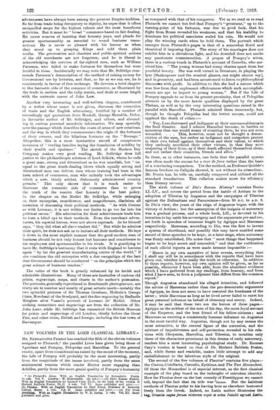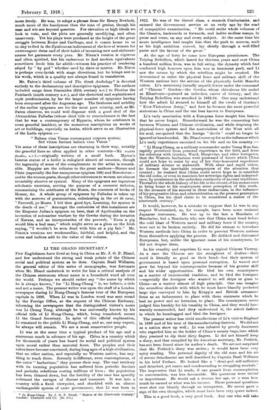NEW VOLUMES IN THE LOEB CLASSICAL LIBRARY.•
MR. BERNADOTTB PERRIN has reached the fifth of the eleven volumes assigned to Plutarch,' the parallel Lives here given being those of Agesilaus and Pompey, Pelopidas and Marcellus. To the general reader, apart from considerations raised by the mood of the moment, the Life of Pompey will probably be the most interesting, partly from the magnitude of the issues involved, partly from the same sentimental reasons which render Hector more engaging than Achilles, partly from the more genial quality of Pompey's humanity • (1) Plutareh's Lines. With an English Translation by Bernadotte Perrin. 11 vols. Vol. Y. London : W. Heinemann. [5a. net.'—(2) Dio's Rosman History. With an English Translation by Earnest Cary, Ph.D., on the basis of the version of Herbert Baldwin Foster, Ph.D. 9 vols. Vol. VI. Same publisher and price.— (8) Plautus. With an English Translation by Paul Nixon, Professor of Bowdoin College, Maine. 6 vols. Vol H. Same publisher and price.—(4) The Creek Anthology. With as English Translation by W. E. Paton. 5 rob, Vol. LIZ Same publisher and price. as compared with that of his conqueror. Yet as we read or re-read Plutarch we cannot but feel that Pompey's " greatness," up to the turning-point of his 'fortunes, was due to good luck, that his flight from Rome revealed his weakness, and that his inability to dominate his political associates sealed his ruin. He would not play the winning cards when he held them. The portrait which emerges from Plutarch's pages is that of a somewhat florid and theatrical if imposing figure. The story of his marriages does not exhibit him in a chivalrous light, and his downfall does not excite any passionate commiseration. A propos of Pompey's wives, there is a curious touch in Plutarch's account of Cornelia, who sur- vived him. " The young woman had many charms apart from her youthful beauty. She was well versed in literature, in playing the lyre [Shakespeare and the musical glasses, one might almost say], and in geometry, and had been accustomed to listen to philosophical discourses with profit. In addition to this she had a nature which was free from that unpleasant officiousness which such accomplish- ments are apt to impart to young women." But if the Life of Pompey appeals to us from its greater proximity, that of Pelopidas attracts us by the more heroic qualities displayed by the great Theban, as well as by the very interesting questions raised in the parallel with Marcellus. Plutarch admired them immensely, but, though he thought Pelopidas had the better excuse, could not applaud the death of either:
" Nay, I am distressed and indignant at their unreasonableness in the final disaster. And I admire Hannibal because, in battles so numerous that one would weary of counting them, he was not even wounded. . . . This, however, must not be thought a denun- ciation of the men, but rather an indignant and outspoken protest in their own behalf against themselves and their valour, to which they uselessly sacrificed their other virtues, in that they were unsparing of their lives; as if their death affected themselves alone, and not rather their countries, friends and allies."
In these, as in other instances, one feels that the parallel system was often made the excuse for a tour de force rather than the basis of a convincing comparison. Yet the method, as Professor Quidde's famous brochure on Caligula showed, is not without its attractions. Mr. Perrin has, he tells us, carefully compared and utilized all the standard translations. This collation makes more for efficiency than literary savour.
The sixth volume of Dio's Roman History2 contains Books LI. -LV., and covers the period from the battle of Actium to the adoption of Tiberius by Augustus and the campaigns of Tiberius against the Dalmatians and Pannonian—from 30 s.o. to A.D. S. In Dio's view, the years of the reign of Augustus began with the victory of Actium; but the assumption of the insignia of autocracy was a gradual process, and a whole book, LII., is devoted to his intention to lay aside his sovereignty and the arguments pro and con, set forth in speeches of immense length by Agrippa and Maecenas respectively. Maecenas, according to Dio, was the first to invent a system of shorthand, and possibly this may have enabled some record of these speeches to be kept; at a later stage, when autocracy was firmly established, Dio notes that " most things that happened began to be kept secret and concealed," and that the verification of such official reports as were made became impossible
Hence in my own narrative of later events, everything that I shall say will be in accordance with the reports that have been given out, whether it be really the truth or otherwise. In addition to these reports, however, my own opinion will be given, as far as possible, whenever I have been able, from the abundant evidence which I have gathered from my readings, from hearsay, and from what I have seen, to form a judgment that differs from the common report.'•'
Though Augustus abandoned his alleged intention, and followed the advice of Maecenas rather than the pro-democratic arguments of Agrippa., he does not seam to have resented the frankness of the latter ; while Maecenas as long as he lived never failed to exert his great personal influence on behalf of clemency and mercy. Indeed, it may be said that these two are the heroes of these pages— Agrippa as the noblest of the men of his day, the most loyal servant of the Emperor, and the best friend of his fellow-citizens ; and Maecenas as exerting a consistently humane influence on Augustus in the most tactful way. Augustus, though not by any means the most attractive, is the central figure of the narrative, and the mixture of impulsiveness and self-protection revealed in his rela- tions with Cleopatra, Marcellus, and Tiberius, to mention only three of the characters prominent in this drama of early autocracy, renders him a most interesting psychological study. Dr. Earnest Cary's version is based on that of Dr. Herbert Baldwin Foster, and, while fluent and readable, makes little attempt to add any embellishment to the laborious style of the original.
The second of the five volumes of Plautus acontains five plays-- the Cessina,Ciatellaria, Curcutio,'Epidicus, and The Two Aferzaechrai. Of these the Menaechmi is of especial interest, as the first classical example of the play based on the imbroglio of mistaken identity. How far Plautus drew on the lost comedy of Poseidipplu3 we cannot tell, beyond the fact that its title was 'Oaoax. But the habitual methods of Plautus point to his having here as elsewhere borrowed freely from the Greek. Indeed, no Latin author illustrates the tag, Graecia captor ferum victorem cepit et arias Intulit agresti Logo, more freely. He was, to adopt a phrase from Sir Henry Newbolt, much more of the handyman than the man of genius, though his ease and wit are beyond question. For elevation or high ideals we look in vain, and the plots are generally unedifying, and often unsavoury. Yet his plays were produced at the height of the great struggle between Rome and Carthage, and it comes home to us to -day to find in the Epidieus an indictment of the love of women for extravagant dress and of their habit of inventing new and elaborate names for garments every year. Mr. Nixon's version is vigorous and often spirited, but his endeavour to find modern equivalents sometimes leads him far afield—witness his practice of rendering edepoi by " by gad " whether used by slave or master. Mr. Nixon is perhaps over-lavish with stage directions, but he brings zest to his work, which is a quality not always found in translators.
Mr. Paton's third volume of The Greek Anthology4 is devoted entirely to the declamatory and descriptive epigrams. The authors included range from Simonides (fifth century p.c.) to Photius the Patriarch (ninth century .&.n.), and the rhetorical and sophisticated style predominates, by far the larger number of epigrams having been composed after the Augustan age. The freshness and nobility of the earlier epigrams are for the most part missing, and, as Mr. Paton observes, we could well dispense with a good deal of the Alexandrian Palladas (whose chief title to remembrance is the fact that he was a contemporary of Hypatia, whom he celebrates in some graceful iambics); or the numerous inscriptions on works of art or buildings, especially on baths, which serve as an illustration of the Latin epigram :- " Baines vine Venus corrurapunt corpora nostra; Sed vitam faciunt balnea vine Venus." Yet some of these inscriptions are charming in their way, notably the graceful lines so often applied in other contexts—Mil ?wive flatolae e.r.X.—originally written of a small bath. Myron's famous statue of a heifer is eulogized almost ad nauseam, though the ingenuity of some of the compliments to the artist is remark- able. Happier are the tributes to the great authors—Homer and Plato (especially the fine anonymous epigram 188) and Herodotus-- and to the women poets, though other references to women are almost invariably abusive or cynical. Many of the epigrams are ingenious scholastic exercises, serving the purpose of a memoria technics, summarizing the attributes of the Muses, the contents of books of Homer, &c. A whole group of epigrams by Palladas is taken up with the sorrows of grammarians, culminating in the cri de cceur, `` Farewell, ye Muses. I bid thee good-bye, Learning, for syntax is the death of me." Amongst the curiosities of this instalment are the Emperor Julian's epigram on beer, that of Apollonides on the invention of submarine warfare by the Greeks during the invasion of Xerxes, and an interpretation of the proverb, " Even a pig would bite a bad man," which might serve as a gloss on the Irish saying, "I wouldn't be seen dead with him at a pig fair." Mr. Paton's versions are workmanlike, faithful, and helpful, and the notes and indices add to the value of the volume.



































 Previous page
Previous page